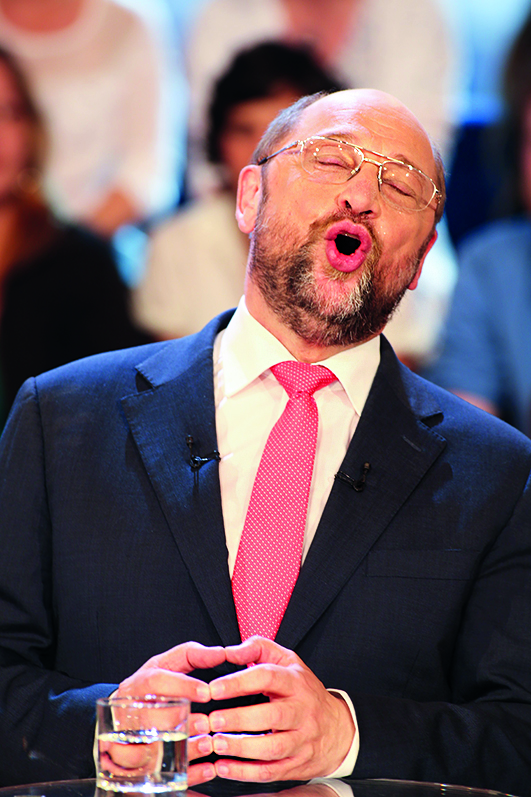Analysis
St. Martin Schulz, miracle worker
For the first time, polls show the Social Democrats ahead of Merkel’s Christian Democratic Union in the German elections. The difference is Schulz’s disavowal of an unpopular labor law.

In late January, Der Spiegel called him a saint. “St. Martin” was smiling on the cover of the weekly, surrounded by colorful cosmic rays. And indeed, Martin Schulz, the former European Parliament president who returned to Germany to seek the chancellorship, seems capable of miracles.
For the first time in the last 10 years, polls released Sunday showed the Social Democrats leading by a point above Angela Merkel’s CDU (33 to 32 percent). In the meantime, Sankt Martin, the pilgrim from Brussels, can boast an approval rating 11 points higher than the chancellor, who until recently did not seem to have any rivals (49 to 38). In a few weeks, the SPD gained 3,000 new members, and all Schulz’ public appearances are sold out. It seems the party has suddenly awakened from the slumber it was in for many years.
On Monday, the new leader captured the headlines of the entire German press with his statement that he wants to correct the 2010 Agenda, the celebrated reform of the labor market and social security with which the Red-Green coalition, led by Gerhard Schroeder in 2003, had assured German competitiveness at the expense of wages and social benefits. The SPD had paid dearly for the coup launched against its traditional electoral base with the loss of the majority and a long subordination under the CDU/CSU that seemed inescapable. The latter, which did not have to execute cuts and restrictions, reaped the benefits of the reform to companies without having to take the blame for its social costs.
Actually, the Schulz miracle has a simple explanation and it is surprising that the SPD has taken so long to get there. Thanks to Schroeder, Merkel was able to move toward the center-left of her party’s axis, gradually abandoning the role and raison d’être of social democracy. A revolution was not needed (for which Sankt Martin is not cut out for). But without a visible turn to the left, the SPD was destined to sink into insignificance. And nothing is more noticeable than taking off the despised 2010 Agenda stone hanging around the neck.
Specifically, Schulz aims to prolong over time the delivery of more substantial unemployment benefits, calculated on a percentage of the last salary earned (later replaced by a minimum living allowance) which covers workers who, after pouring in contributions for several years, are denied the entitlement after a few months. These workers and employees of a certain age, long time supporters of the PSD, were cut off by the rationalization of the production system. They have not forgiven the SPD for turning its back on them.
More generally, Schulz then promises to stop and regulate the use of forward contracts. In short, the classic social democratic measures that come from where they logically had to come. But in this case, they indicate a change of direction, the removal of a taboo. There are some visible cracks in the idea that everything must be sacrificed for the competitiveness of the German model, its exports, and its trade surplus (outside the parameters set out by the E.U.), for which a large part of Europe pays with deficit and recession.
But elections are still quite far in the future, and it is difficult to predict the endurance of Schulz’ image as an outsider. And it is even more difficult to say how far the candidate could go (as a conservative character reluctant to every radicalism) on the way to a resumption of wage growth, consumption and government spending in Germany. Further, it is still uncertain how he will move on the European chessboard, this time from the nest of hawks in Berlin.
There is little doubt, however, that the wind is changing in the European social democracies and it seems there is a trend toward the conversion to neoliberalism that had marked the work of Blair, Schroeder and Hollande (the newest arrival). Schulz seems to lie in this wake of change in the most steadfast and decisive country in the continent.
Originally published at https://ilmanifesto.it/miracolo-schulz/ on 2017-02-21
